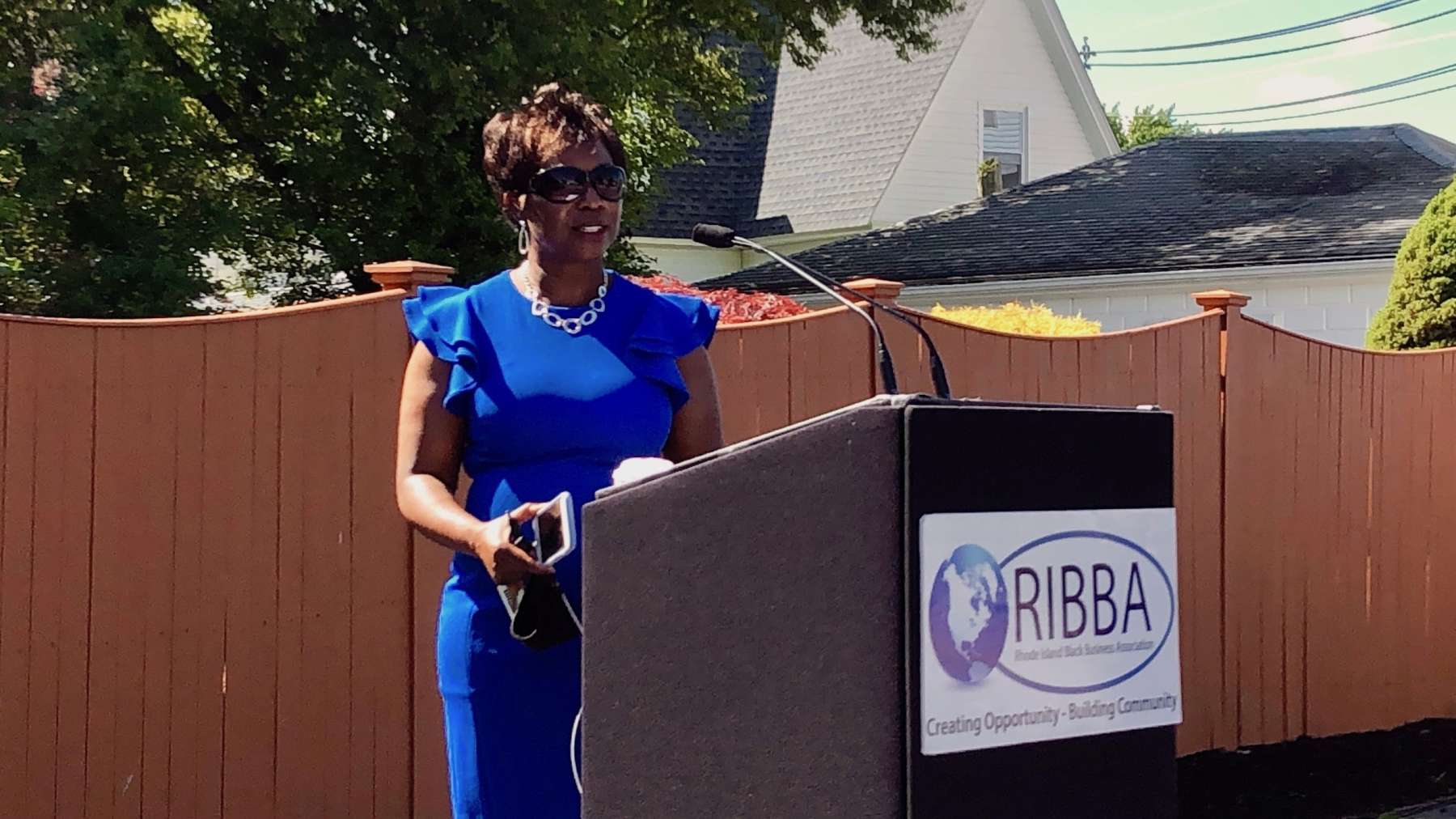What can be done to improve the outcomes for Black and Brown businesses in Rhode Island?
“Black and Brown businesses have been historically left behind,” said Lisa Ranglin. “We’re hearing that 50% of minority businesses may not survive COVID… We’re talking about people, real families…“ “The state of Black and Brown owned businesses in Rhode is alarming,” said Lisa Ranglin, founder and President of the Rhode Island Back Business Association (RIBBA) at a press conference on
July 2, 2020, 8:24 pm
By Steve Ahlquist
“Black and Brown businesses have been historically left behind,” said Lisa Ranglin. “We’re hearing that 50% of minority businesses may not survive COVID… We’re talking about people, real families…“
“The state of Black and Brown owned businesses in Rhode is alarming,” said Lisa Ranglin, founder and President of the Rhode Island Back Business Association (RIBBA) at a press conference on Tuesday. “Compared to neighboring states like Massachusetts, Connecticut and New York, Rhode Island’s small businesses have the smallest payrolls and are the lowest in total receipts.”
Ranglin gives the state a grade of D+, which one of the other speakers at the press conference reacted to with a laugh. “Lisa gave the state a D+,” said State Representative Marcia Ranglin-Vassell (Democrat, District 5, Providence). “She’s so generous.”
Ranglin aid that other issues confronting the state’s Black and Brown business owners and workers include:
- Black and Brown-owned businesses in Rhode Island are significantly smaller than white-owned small businesses: There are no Black-owned business with 100 or more employees in Rhode Island; and
- 61% of Black owned and 54% of Brown-owned small businesses in Rhode Island have four or fewer employees. Comparatively, 50% of white owned small businesses employ 4 to 20 workers.
- Black unemployment is consistently approximately double white unemployement
- One in three Black persons worked part-time because they were unable to find full-time work due to the weak economy
Despite the passage of his law requiring ten percent minority hiring for state sponsored construction jobs, “the intent was subverted,” said State Senator Harold Metts (Democrat, District 6, Providence). “The reality is that our Black and Brown contractors are still left on the outside trying to get in.
“Laws on the books lack enforcement. Perhaps it’s time for Black and Brown contractors to sue the state,” said Metts.
Lisa Ranglin later confirmed that RIBBA is consulting with the Rhode Island ACLU about the possibility of launching such a lawsuit.
“I have introduced a series of legislation over the last four years… that would have… reduced the number of deaths due to COVID in Rhode Island,” said Representative Ranglin-Vassell. “We’re talking about a $15 living wage. Most people who have sadly passed away, they’re in the front lines. They need safe staffing in nursing homes. We need to pass that bill. The General Assembly needs to step up and pass a $15 living wage. It’s not okay that people working up to 80 hours a week and still are living in poverty. That is a shame. It’s a moral imperative and we need to do it now.”
“When I look back on our journey, you know, we’ve won hundreds of awards,” said Junior Jabbie, President and CEO of Banneker Supply Chain Solutions. “We do business with several Fortune 100 clients. Since I joined Banneker in 2005 every Rhode Island Governor has been through our doors. Every single US Senator from Rhode Island has been through our doors. Every single US Representative from Rhode Island has been through our doors, as well as many, many many other Rhode Island elected officials as well as officials from the Federal government. Not to mention Barrack Obama coming to Rhode Island College in 2012 and.. calling out Banneker during his speech.
“And despite all that – over 30 years in business – we’ve maybe had one state contract, and that has maybe totaled $50,000…”
“There’s a lot of money that is being given to corporations,” said Arnell Millhouse, CareersDev Computer Science Institute, Entrepreneur in Residence, Brown University, Nelson Center for Entrepreneurship. “It’s time that we stand up and demand that or we vote these people out. Barrack Obama said a few weeks ago ‘We need to make people in power uncomfortable.’
“We cannot stand by idly any more. We can’t just protest any more. We have to show up at Senate Finance meetings and make ourselves known.”
Jhonny Levya, President of the Black Contractors and owner of Heroica Construction, Inc presented a set of six initiatives he feels need to be done to improve minority participation in the construction industry:
- Require MBE (Minority Business Enterprise certification) at time of bid.
- “The existing regulations call for sanctions,” said Levya. “I have never seen any sanctions going on.”
- Levya would love to see the Office of Diversity, Equity and Opportunity be a cabinet position.
- “I would like to see the MBE (Minority Business Enterprise) and WBE (Women Business Enterprise) separated. I would like to see it like they do in Massachusetts, where they have MBE goals and WBE goals,” said Levya.
- “I think we need ‘set asides,” said Levya, that is, a government contract awarded without competition to a minority-owned business. The state just did a no-bid contract. “I don’t see why we can’t do set asides,” said Levya.
- Lastly, we need more enforcement of existing regulations. “A lot of contractors get away with saying we use MBEs and they never do,” said Levya.
Lisa Ranglin
- Rescind the MBE waiver – currently Prime Contractors are telling Black and Brown contractors that they no longer need to include Minority Business Enterprises;
- Increase the government procurement participation goal for Black and Latino contractors to reflect the increased minority population in Rhode Island;
- Issue an Executive Order to establish preference in state contracts where Black and Brown people are the predominant group to be served or when contracts are cited within a neighborhood where the population is 20% or more minority;
- Pledge at least 20% of funding to economic development in Black and Brown communities;
- Work with organizations led by Black and Latino leaders;
- Increase loan funds available through Black and Latino organizations;
- Establish a Contract Compliance office outside of government to monitor and enforce compliance to MBE commitments. The office to conduct compliance will check on awarded contracts to ensure contractors use MBE firms at all levels as committed to the bid and the contract. Included in responsibilities, the Contract Compliance office will investigate complaints of non-compliance and develop corrective action plans as needed;
- Put in place a monitoring system to track MBE purchasing to improve participation and produce and publish an annual progress report;
- Set goals for major purchasing categories that roll up to meeting the overall MBE purchasing goal;
- Continually work to write bid specification to maximize inclusiveness;
- Increase minority representation to the state workforce and decision-making roles to better reflect Rhode Island’s changing demographics;
- Implement a Pay Audit System to be used by Prime Vendors and their Subcontractors to independently report payments from Prime Vendors to the Subcontractors on state contracts;
- Implement Executive Order 13-05 signed by former Governor Lincoln Chafee, to promote greater minority representation in the state workforce to better reflect Rhode Island’s changing demographics
- Establish a Contract Compliance office outside of government to monitor and enforce compliance to MBE commitments. The office to conduct compliance will check on awarded contracts to ensure contractors use MBE firms at all levels as committed to the bid and the contract. Included in responsibilities, the Contract Compliance office will investigate complaints of non-compliance and develop corrective action plans as needed; and
- Governor Gina Raimondo and her leadership committing to meeting with leaders of the minority business community and establish ongoing working collaboration efforts to strengthen the Black and Brown business community.
“The shit ain’t right,” said Chef Phyllis Arffa, former owner of Blaze Eastside. “We all know it ain’t right, and no one is coming to save us. In 2020, we’ve got to save ourselves.
“In Asian communities, the dollar circulates among the community – banks, retailers, business professional – before it’s spent to outsiders up to two weeks. In Jewish communities the circulation period is 19 days. In predominately WASP areas, the period is 17 days. Hispanics keep their dollars seven days.
“Do you know how long Black communities keep their dollars? Six hours.”
The last scheduled speaker was Graig Bustillo, owner of True Quality Construction.
Lisa Ranglin with closing remarks:
















